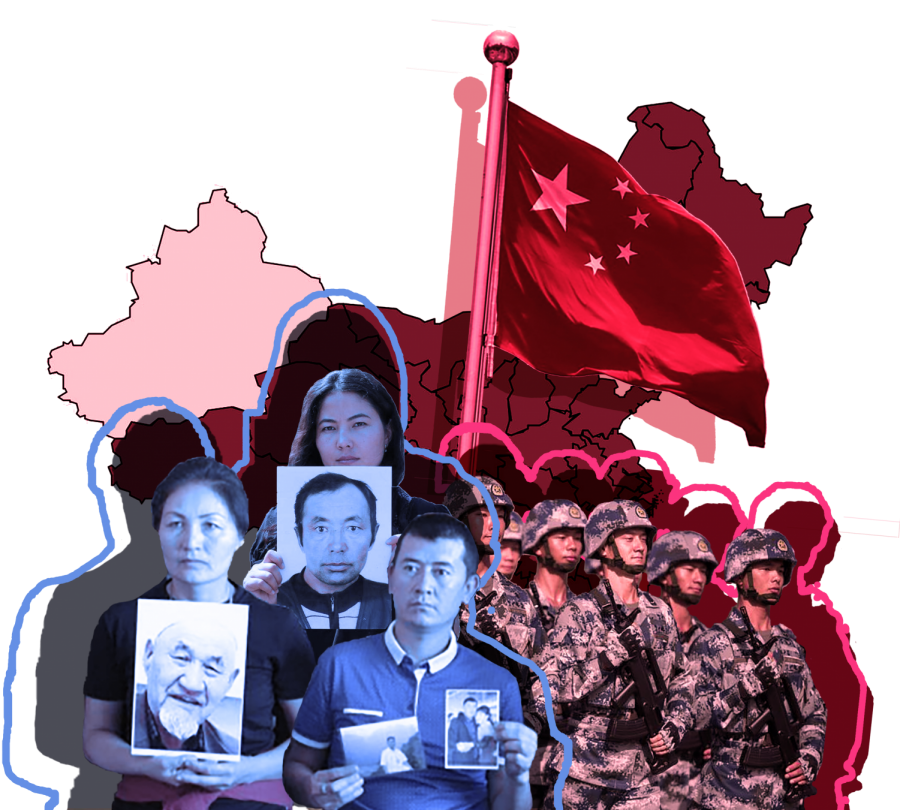The Silent Suffering of the Uighurs
This graphic depicts various Uighurs holding up relatives that have either been killed or missing in detainment camps. To the right, Chinese officials are marching with the flag of China. All figures form the outline of Xinjiang, the region in which the highest number of camps run.
February 13, 2020
In a large country, remote facilities run hundreds of “re-education” camps dedicated to completely erasing the cultural identity of an ethnic minority. In this specific corner of the globe, the religious freedom that we in the U.S. so carelessly take for granted is not a right, but a rarity. This is the reality of the Xinjiang region of China, where every day, Uighurs are taken from their families and deprived of their way of life.
“All of my family besides my parents and one of my uncles is back there suffering,” sophomore Zilala Mamat said.
For the past decade or so, China’s harsh efforts to control the Xinjiang province, known to its residents as East Turkestan, have dramatically escalated. Starting around April 2017, China began detaining Uighurs, Uzbeks, Kazakhs and other Turkic minorities.
“Some Uighur Muslim children in China have been separated from their families,” senior Varun Yadav said. “Now the parents have to make the decision of if they’re going to go back to their country and potentially be held in detention camps. It’s a horrible situation.”
Family separation, while a gross violation of human rights, is only one of the many psychological abuses Uighur Muslims endure in China. They are also forced to drink alcohol, eat pork and renounce Islam, completely stripping themselves of their moral virtues and identity. Muslim women are forced to remove their hijab, undergo sexual abuse and have contraceptive devices implanted against their will. China is committing egregious violations of human rights without justifiable cause.
“The Chinese government claims [the camps are] a way to combat religious extremism,” Yadav said. “They want to preserve that communism doesn’t have a religion, and if there’s a large Muslim community, then they’ll want to suppress it.”
According to the Council on Foreign Relations, most of the people held in the camps have never committed crimes. These “vocational centers” are an extreme example of China’s effort to maintain its largely homogenous society and stamp out any potential for opposition. The religious extremism described by the government is exaggerated as an excuse to indoctrinate Muslim minorities. In place of prayers and texts are political songs and chants, force-fed by the government.
“Uighurs are being put in ‘re-education’ camps in order to create a ‘better equipped’ Chinese citizenry,” senior Esraa Dafaalla said. “At the heart of the issue is ethnic cleansing and erasure in its simplest form.”
According to Business Insider, another reason why the Chinese government is persecuting the Uighurs in Xinjiang is because of the massive economic benefit that the region provides for its large-scale transportation project: the Belt and Road Initiative. Also referred to as the second Silk Road, the Belt and Road Initiative aims to link Beijing with Europe via railroads and other infrastructure projects. Unfortunately, this new road passes straight through Xinjiang and is built on the backs of the very same Muslim Uighurs being persecuted.
“A lot of the Uighur Muslims are being forced to work for China,” Yadav said. “They are basically free labor.”
Just as we stood up for the rights of immigrants, African Americans, women and minorities alike, we cannot ignore the abuse occurring in China. Thankfully, measures are being taken against China’s inhumane persecution; a bill called Uighur Human Rights Policy of 2019 has passed the House and is now waiting to be passed in the Senate. This policy will give Congress a list of names of the abusers and install sanctions against them. These are the kinds of steps we need to take against the crimes in China. By not standing up against this behavior, we are actively asserting that we tolerate it. As one of the most influential and powerful world leaders, America should have more involvement in finding a resolution to this issue.
“Over the course of a few months, [the population in the camps] increased by one million. I think that [America] should be involved, especially because America stands for freedom and human rights,” Mamat said. “This is an issue that America should step into because clearly other countries are intimidated by China’s power and economic stance, and the U.S. has the capability to stand up to them.”



